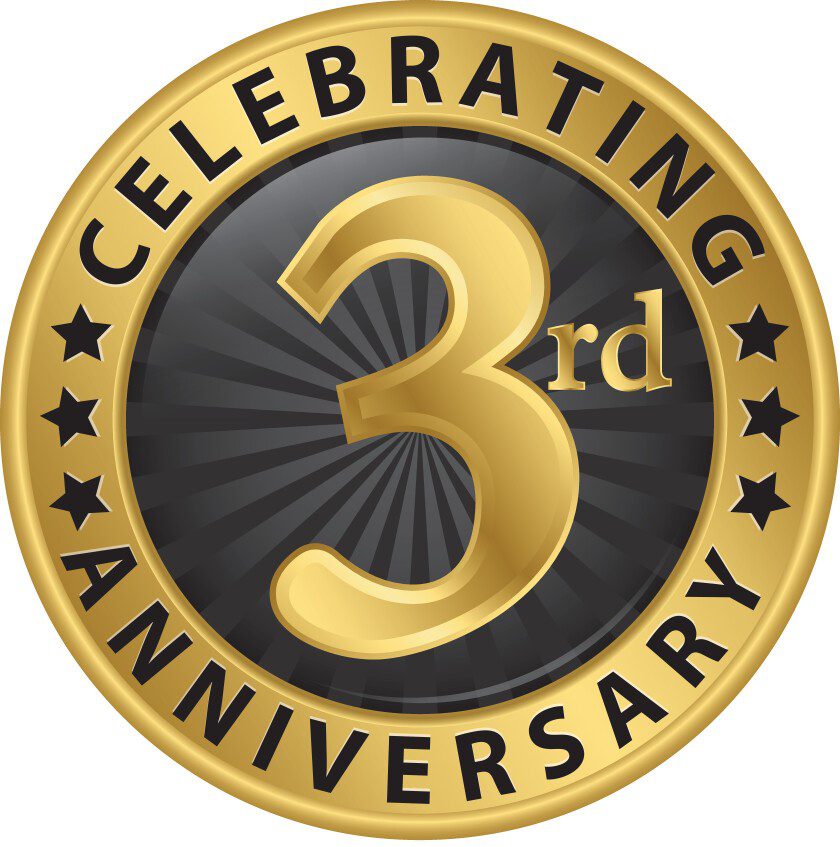‘I was surprised at how many people were interested in this,’ said Protect Democracy’s Chris Crawford, who has led discussions with faith leaders about possible election scenarios.
By Adelle M. Banks
(RNS) — At a small Presbyterian church in Virginia, members met to prepare for the outcome of the 2024 election, praying, reading Scripture, and strategizing how they will help their local community depending on who is victorious.
At an Episcopal Church in St. Paul, Minnesota, a core group of about a dozen people engaged in a listening process that will influence their programs and budget after the November election.
At a Presbyterian church in New York City, congregants planned a meditative service on the Wednesday after Election Day to reflect on the election outcome — or lack thereof — and include immigrants who they expect could feel vulnerable after the votes are counted.
As questions loom about the outcomes of the 2024 election, faith leaders and some congregations are taking the matter into their own hands — and imaginations. Across the country and on many Zoom meetings, lay people and clergy are envisioning different possible scenarios — a Harris victory, a Trump win, a change in congressional leadership or an unclear outcome — and thinking, praying, and determining how to respond to each.

The congregations in Virginia, Minnesota and New York have followed or been inspired by a “Day 1 Guide” produced by the Vandersall Collective, a consulting firm that aids houses of worship with fundraising and long-term planning. The guide’s focus is not so much on the first day of the next presidential term but, as it reads, “reclaiming perspective in an election year and finding a throughline for shared priorities regardless of election outcomes.”
The 20-page guide includes a prayer by Mieke Vandersall, the collective’s founder, that begins: “Holy One, who knows what it feels like to be overwhelmed, Hold our overwhelm.”
St. John the Evangelist Episcopal Church in St. Paul, Minnesota, is holding a weekly gathering, the “Faith Forum Series: Facing Our Fears,” through the Sunday before Election Day. The church’s pastor, the Rev. Jered Weber-Johnson, said it’s given congregants a new perspective on pre- and post-election concerns.
“My hope is that this will reorient our fear or anger or even joy and celebration, regardless of the outcome, to push for policies and greater support for those that our government and society routinely disregard and leave behind, regardless of which party is setting policy,” he said in an email to RNS.
Added the Rev. Thia Reggio, whose New York church is also planning a neighborhood peace walk in January before the inauguration: “We’ve recommitted ourselves to our ministries, to the groups we identified at high risk, and have begun to develop plans for how those ministries will look depending on election outcomes.”
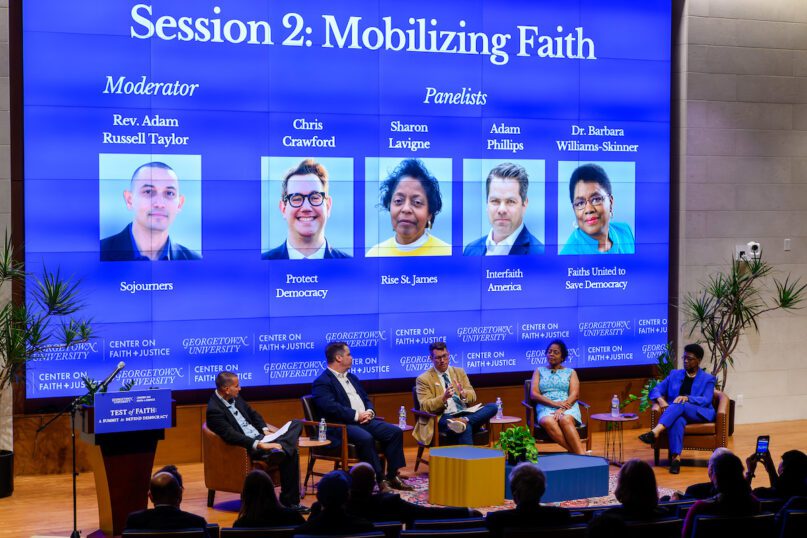
Chris Crawford, policy strategist for Protect Democracy, an anti-authoritarian nonpartisan group, said he has worked with about 20 faith-based groups, including interfaith groups such as Interfaith America, since January to prepare for the election, helping them consider what role they could have in keeping the peace and ensuring everyone who wishes to vote has that opportunity.
“I was surprised at how many people were interested in this,” said Crawford of the mostly online training. “I think in some ways they might even find it comforting to come face to face with some of the most anxiety-inducing outcomes that we could have to know that they’ve thought about it and know that there are other people thinking about it.”
Speaking primarily to nonpartisan nonprofit faith organizations focused on democracy and voting rights, Crawford has described a variety of scenarios, from a Pennsylvania voting campaign that results in so many voters lining up in a heavily Republican county that it runs out of ballots, to a deepfake video that shows an Arizona county election official’s plans to guarantee a Democratic presidential win.
Crawford said he provides resources to faith leaders on the center right but, as far as scenario planning, “within the conservative religious leaders who I’ve talked to, this has not been something that they’re interested in as one of the tools to prepare for the election.”
After some Protect Democracy sessions, leaders of religious groups have become advocates for poll chaplains or peacekeepers at voting centers; others have sought to build connections with election officials, such as by attending pre-election testing of equipment used to scan and tabulate election results.
For T’ruah, a nonpartisan Jewish human rights organization, planning for possible election outcomes was not new for the organization, but took on a new urgency after the 2020 election.
“Jan. 6 hadn’t yet happened,” the organization’s CEO, Rabbi Jill Jacobs, noted. “When we were preparing for the 2020 election, we kind of were worried about violence in the abstract. Now, we’re a lot more worried about it in the specifics.”
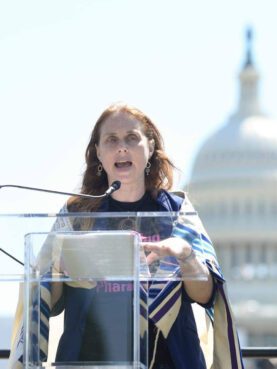
But Jacobs added: “The ideal thing is we’ve spent a lot of time preparing for something that you then don’t have to worry about.”
Beyond the online preparatory discussions, T’ruah has encouraged its members, which total 2,300 rabbis of different denominations, to sign up to be poll workers inside voting centers or to go through a training by Faiths United to Saved Democracy to serve as poll chaplains outside.
Jeanné Lewis, CEO of Faith in Public Life, said her nonprofit multiracial and multifaith coalition gathered in July with Crawford and other partners to discuss election scenarios. Since then, affiliated leaders of numerous faiths have included lessons from those scenarios as they train people in a “peacemakers program” to speak to their congregations and the media to “advance a narrative around peace in this election.”
T’ruah and Faith in Public Life officials say they also are concerned about inaccurate election information and how to dispel it.
“There are trusted experts that faith leaders can validate around information,” Lewis said. “What is the board of elections saying? What is the secretary of state saying? What is the Department of Justice saying? So, there are agencies, entities, trusted messengers that faith leaders can amplify and can validate.”
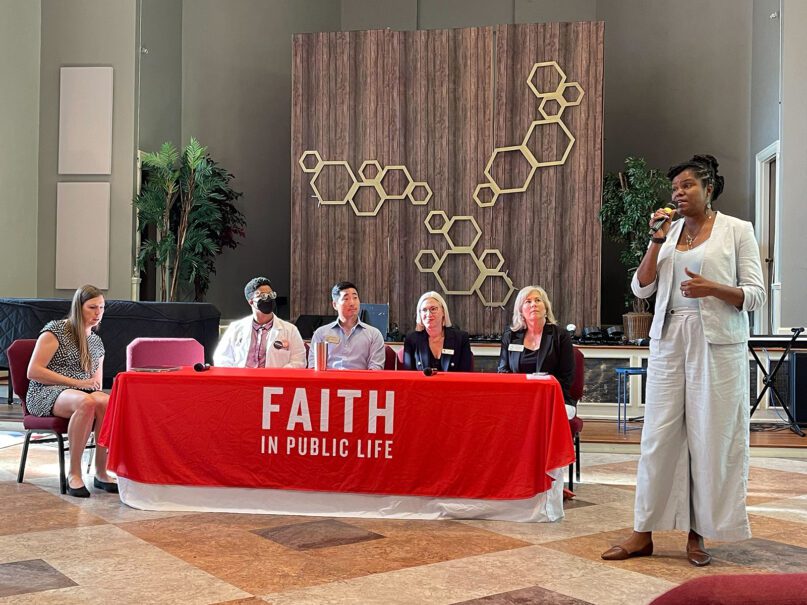
At Arlington Presbyterian Church in Virginia, just six miles over the Potomac River from the White House, some congregants have stayed after worship service to read and reflect on different scenarios. A 12-page document includes possibilities of government shutdowns, another pandemic and job insecurity for federal workers. But it also looks at possible local consequences such as Gov. Glenn Youngkin stepping up restrictions on trans youth or efforts to “police immigrant communities.”
“We do not want to limit our planning for the most optimistic or most likely outcome, but to ensure our plans are robust enough for any outcome,” reads the first page of the church’s scenarios document.
The Rev. Ashley Goff, pastor of Arlington Presbyterian, said the “Day 1 Guide” was the catalyst for her congregation to pursue its own set of scenarios, which they have discussed together and prayed over, including about the risk-taking that may be necessary.
“If this was a Mitt Romney-Harris election, we probably would not be running these scenarios, but because of the gravity of this election and the possibility of a Trump victory, and the impact that that victory could have on our neighbors — and us — that’s why we’re running these scenarios,” she said.
For a Harris win, said the Rev. Carla Gorrell, a retired minister who worships at the Arlington church, “that scenario points out that there is very likely to be a lot of pushback from her agenda, her goals, from Congress.”
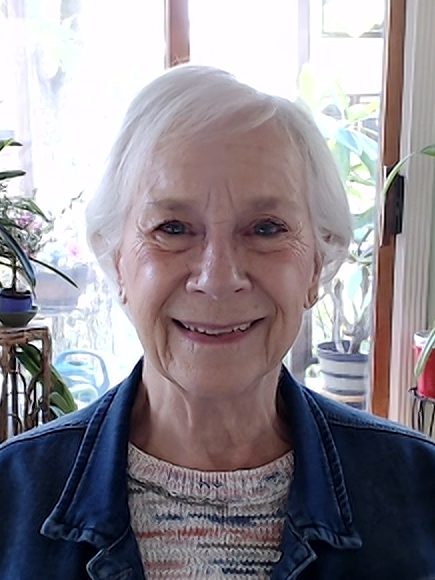
With concerns about racism, xenophobia, and homophobia, Gorrell said, “that backlash may happen even stronger to a Harris administration. So, the same needs — to seek justice and to support communities who are more vulnerable — will still be there.”
As is the case for other faith-based organizations, prayers are part of the church’s scenario considerations, Gorrell said, for whatever congregations might do – from protesting to attending county board meetings to providing support for communities who may need assistance after the election results are known.
Gorrell, a self-described “political junkie” who lived and worked through other times of turmoil, including Watergate and the Reagan assassination attempt, said she’s looking forward to a decision after all the discussion of what might occur.
“We think – we don’t know,” she said. “I can’t wait ’til this election is over. I just want to know.”
First published Oct. 24, 2024

